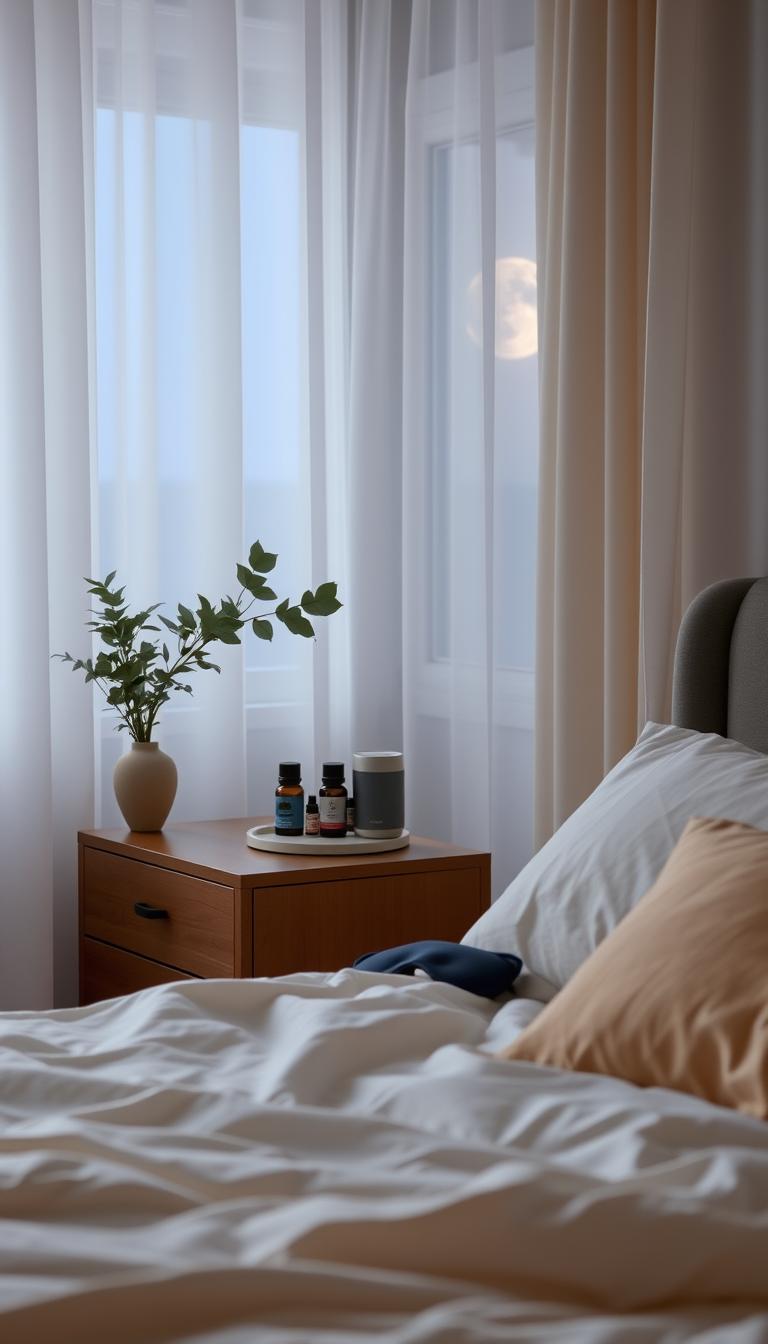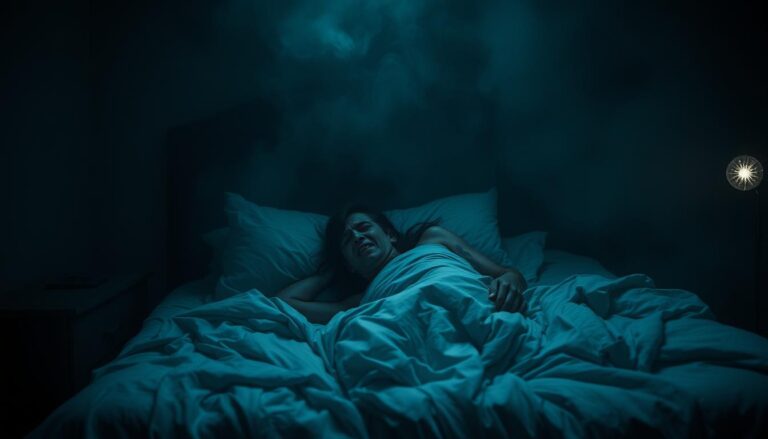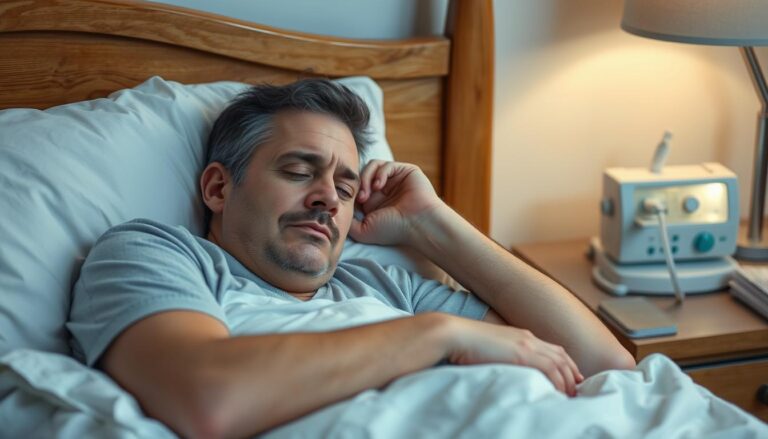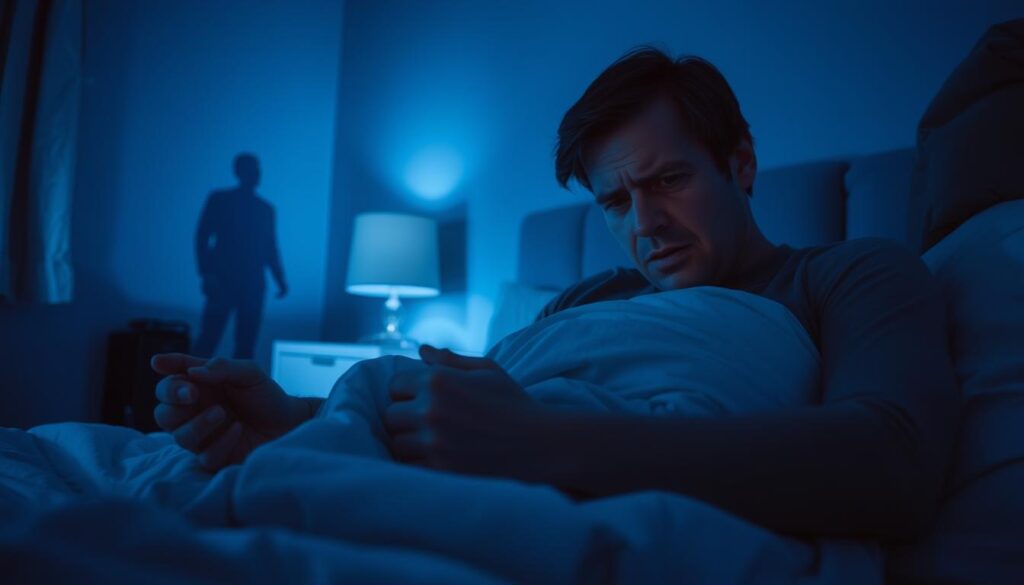
Could your anxiety symptoms be linked to a hidden struggle happening while you sleep? 25 million Americans live with sleep apnea. This is making people look closely at the link between sleep apnea and anxiety. Every year, 38,000 heart disease deaths are linked to sleep apnea. This condition causes breathing to pause up to 30 times per hour in severe cases.
Research shows anxiety disorders hit hard in those with sleep apnea, especially women. Imagine waking up gasping for air dozens of times a night. Then, facing the day feeling exhausted and anxious.
This cycle is real. A 2014 study found severe sleep apnea triples anxiety risks. Everyday struggles, like 60% of anxiety sufferers also dealing with depression, show a deep connection between disrupted sleep and mental health. If you feel stuck in a cycle of poor sleep and rising stress, understanding this link could be your first step to relief.
Key Takeaways
- Over 25 million Americans have sleep apnea, often paired with higher anxiety rates.
- Sleep apnea patients face a 2.17x higher risk of panic disorder than the general population.
- Women with sleep apnea are 54% more likely to develop panic disorder compared to men.
- Untreated sleep apnea worsens anxiety, creating a cycle of poor sleep and mental strain.
- A sleep study (polysomnography) is the only way to confirm sleep apnea and address its mental health impacts.
Understanding Sleep Apnea and Its Effects on Your Body
Over 22 million Americans have sleep apnea. It stops your breathing and messes with your sleep. Let’s see how it affects you.
What Happens During a Sleep Apnea Episode
When you stop breathing, your brain wakes you up. This happens every night. It affects your body and mind in big ways.
- Gasping or choking sensations
- Heart rate spikes and blood pressure spikes
- Fragmented sleep stages, blocking deep rest
The Different Types of Sleep Apnea
| Type | Cause | Common Symptoms |
|---|---|---|
| Obstructive (OSA) | Airway blockage | Loud snoring, choking during sleep |
| Central (CSA) | Brain signal failure | Difficulty staying asleep, morning headaches |
| Complex Sleep Apnea | Mix of blockage and brain issues | Combines OSA and CSA symptoms |
Physical and Mental Effects of Disturbed Sleep
Chronic episodes harm your body. Studies show:
- 62% of OSA patients have anxiety (European Medical Journal, 2012)
- Low oxygen levels (SpO2) worsen mental clarity and mood
- Long-term risks include heart disease and diabetes
These issues create a cycle. Sleep disorders and anxiety feed off each other. Even mild cases can raise stress hormones, making anxiety worse.
The Complex Relationship Between Sleep and Mental Health
Sleep and mental health are closely linked. The relationship between sleep apnea and anxiety goes both ways. Sleep problems like sleep apnea can make anxiety worse. At the same time, anxiety can make it hard to sleep well.
When sleep apnea stops your breathing, it’s hard for your brain to enter deep sleep. This deep sleep is key for handling emotions.
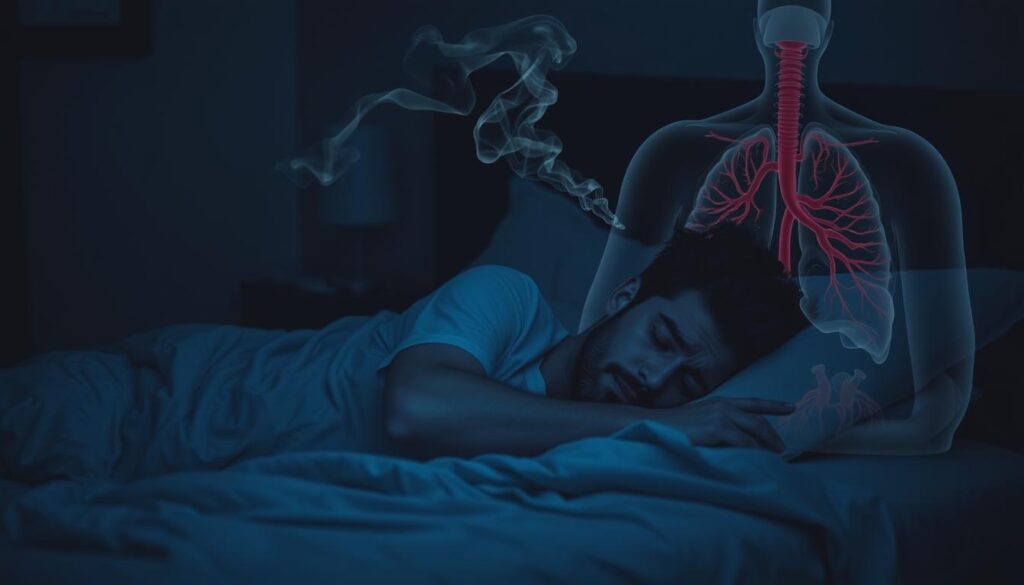
Studies show 53.9% of people with sleep apnea have anxiety. Without enough deep sleep, your brain can’t handle stress well. This makes you more likely to react to stress.
This creates a cycle: anxiety makes it hard to sleep, and poor sleep makes anxiety worse. Even one bad night of sleep can increase anxiety in healthy people. This shows how delicate the balance is.
Think of it like a seesaw: when sleep apnea disrupts your rest, your mental health suffers. Nighttime worries or panic can keep you awake. Daytime tiredness from poor sleep makes it hard to deal with stress.
The pandemic made things worse—56% of adults had sleep problems during lockdowns. Anxiety rates went up with “Coronasomnia.”
To break this cycle, you need to understand how sleep apnea and anxiety affect your body. If you snore a lot, wake up gasping, or feel very tired, it might be a sign. Fixing sleep problems can help ease anxiety. Managing stress can also improve sleep quality over time.
Does Sleep Apnea Cause Anxiety? Exploring the Direct Connection
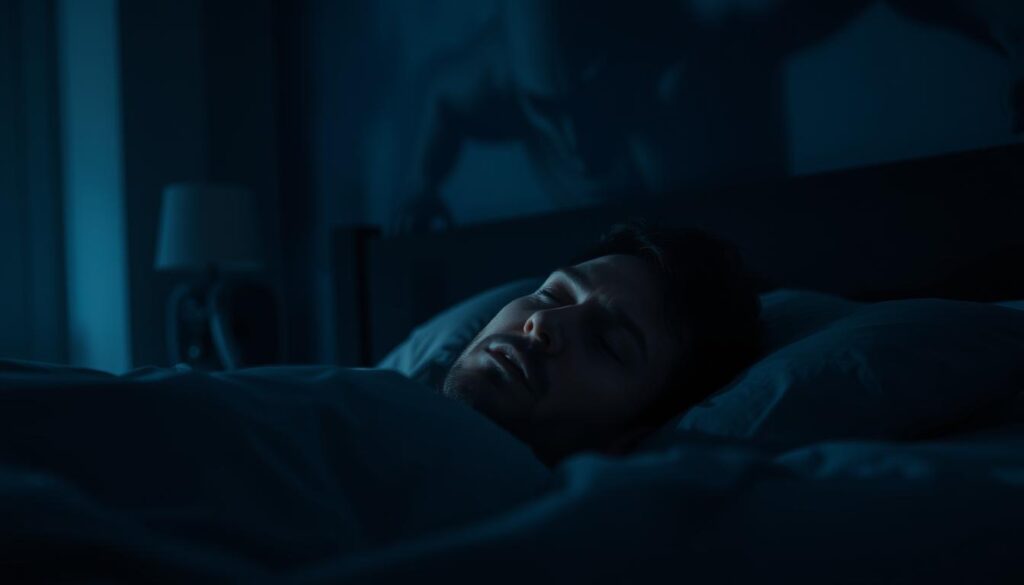
Let’s dive into the does sleep apnea cause anxiety question. Sleep apnea means your breathing stops many times at night. This makes your brain get less oxygen. This sleep apnea anxiety connection changes how your brain deals with stress. Here are the facts.
How Oxygen Deprivation Affects Your Brain
Each time you stop breathing, your brain gets less oxygen. This hurts areas like the amygdala and prefrontal cortex. These parts help you feel fear and calmness.
Over time, this can make you more anxious. It’s like your brain’s panic button is always on. This is what happens when you don’t get enough oxygen.
The Role of Stress Hormones in Sleep-Disrupted Individuals
Your body sees sleep apnea as a crisis. Stress hormones like cortisol go up. This makes you feel like you’re always ready to fight or run.
High cortisol levels can make it hard to sleep. This creates a cycle: bad sleep → more stress hormones → more anxiety. This is why 16.2% of people with sleep apnea feel anxious, compared to 5.5% without it.
Research Evidence on the Sleep Apnea-Anxiety Link
- A 2014 study found people with OSA had 3.68x higher odds of anxiety.
- A 2015 Taiwan study linked severe OSA to a 2.17x higher risk of panic disorder.
- Over 22 million Americans have sleep apnea, yet 80% of cases go undiagnosed, leaving anxiety symptoms untreated.
These numbers show the sleep apnea anxiety connection is real. If you’re feeling anxious and don’t know why, your sleep might be the key.
Common Symptoms That Overlap Between Sleep Apnea and Anxiety
It’s important to know the sleep apnea anxiety symptoms to avoid wrong diagnoses. Both can cause fatigue, trouble focusing, and feeling irritable. But how do you tell them apart?
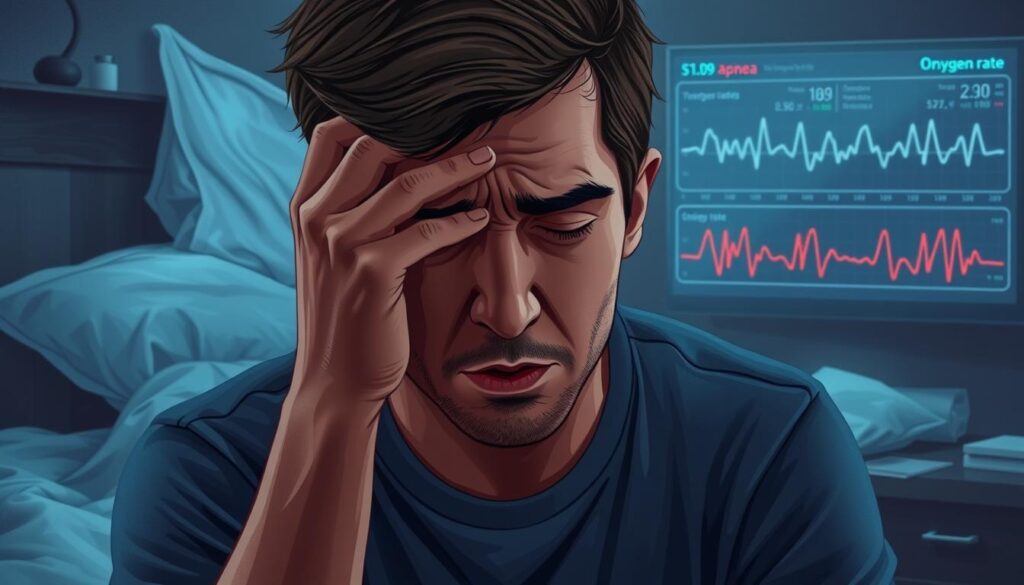
| Symptom | Sleep Apnea | Anxiety |
|---|---|---|
| Snoring | ✓ | ✗ |
| Restlessness | ✗ | ✓ |
| Fatigue | ✓ | ✓ |
| Nighttime sweating | ✓ | ✓ |
| Difficulty falling asleep | ✓ | ✓ |
Fatigue and night sweats are symptoms of both, making it hard to find the cause. Over 53% of sleep apnea patients also have anxiety, studies show. Here are some signs to watch for:
- Daytime drowsiness after a full night’s sleep (apnea)
- Unexplained mood swings or panic attacks (anxiety)
- Choking sensations during sleep (apnea)
Morning headaches and constant worry could mean you have both. Sleep apnea affecting mental health can create a cycle. Poor sleep leads to anxiety, which makes sleep worse. The American Academy of Sleep Medicine says 22 million U.S. adults face this issue.
Look for these signs:
- Anxiety symptoms improve when sleep issues are treated
- Medication for anxiety doesn’t fix sleep problems
Remember, you’re not alone with overlapping symptoms. Dentists can check for apnea with oral appliances. Cognitive behavioral therapy helps with anxiety. Early treatment can improve both physical and mental health.
How Untreated Sleep Apnea Can Worsen Existing Anxiety Disorders
If you have anxiety, not treating sleep apnea can make small worries huge. Every night, when breathing stops, your brain stays stressed. This makes it hard to handle anxiety, like panic attacks or feeling tense all the time.
Sleep apnea and anxiety together create a tough cycle. It’s hard to get out of this cycle without help.
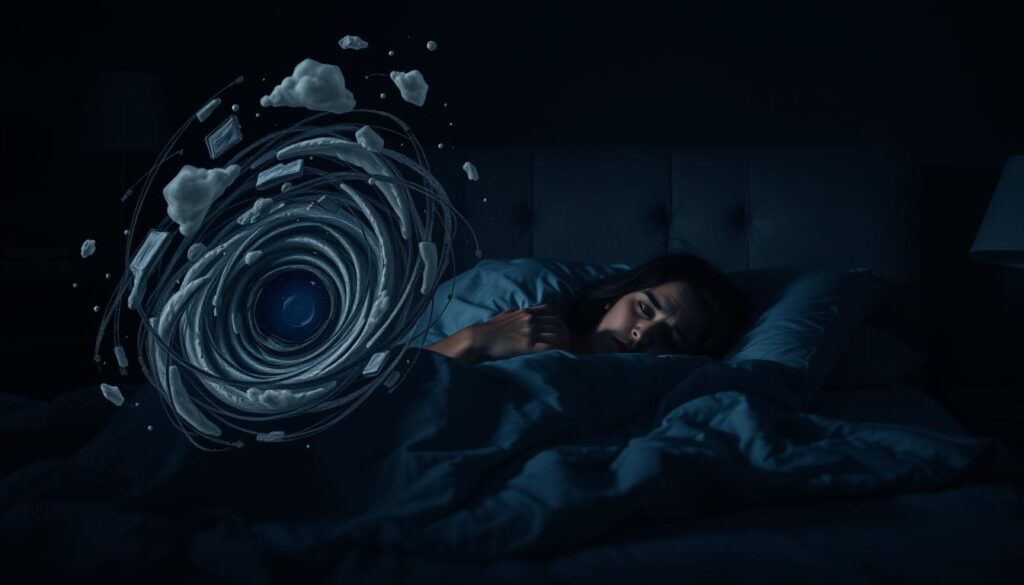
- Chronic sleep disruptions lower serotonin levels, worsening anxiety.
- Daytime fatigue reduces motivation to practice coping strategies for anxiety.
- Untreated sleep apnea affecting mental health can double therapy resistance, making recovery harder.
“My panic attacks got worse until I started CPAP treatment. Now I finally feel in control.” — Veteran with PTSD and OSA
Studies show 50-80% of people in mental health clinics have sleep issues linked to sleep apnea. Without treatment, this pattern continues: poor sleep → higher anxiety → worse sleep. But breaking the cycle works.
One study found 75% of patients saw anxiety improve after 12 months of CPAP use. But, some new users feel claustrophobic from masks. So, working with a doctor to adjust therapy is key.
Ignoring sleep apnea’s impact on mental health risks long-term harm. Addressing both conditions together stops the cycle. This gives your mind and body the rest they need to heal.
Diagnosing the Connection: When to Talk to Your Doctor
If you wake up suddenly with panic, feel tired all the time, or have signs of sleep apnea linked to anxiety, see a doctor. Early diagnosis can stop the cycle of sleep disorders and anxiety before it gets worse. Here’s what to expect when you look for answers.
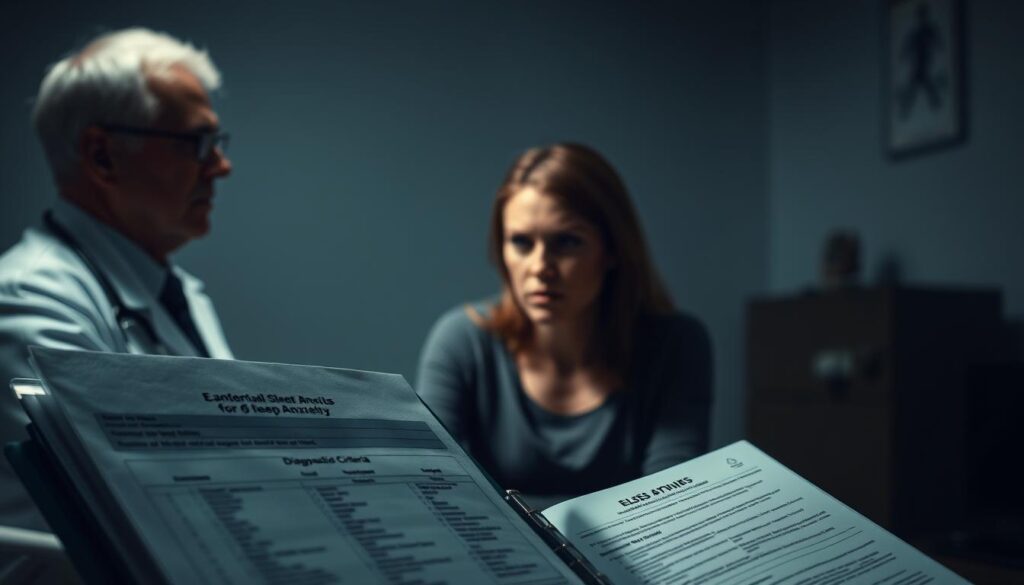
A sleep study (polyssomnography) tracks your heart rate, oxygen levels, and brain activity at night. It shows how severe sleep apnea is. Home tests can miss some signs.
For anxiety, psychologists use tests and interviews. They check your mental health. Since over 50% of people with anxiety also have sleep problems.
Tell your doctor about all your symptoms, no matter how small. Over 80% of sleep apnea cases are missed. But acting early can help a lot. Don’t wait—your health depends on linking your sleep and mental health.
Treatment Approaches That Address Both Sleep Apnea and Anxiety
Managing the sleep apnea anxiety connection needs a team effort. To treat sleep apnea anxiety, we must tackle both at once. Here’s how to do it:
CPAP Therapy and Its Impact on Anxiety Levels
CPAP devices help keep airways open at night. This reduces sleep apnea episodes. Research shows that regular CPAP use can lower anxiety by improving oxygen flow.
If the mask feels uncomfortable, talk to your doctor. They can help adjust it or suggest exercises to get used to it. Over 80% of users see their anxiety drop after 3 months.
Lifestyle Changes That Improve Both Conditions
- Exercise daily: 30 minutes of walking or yoga can help. It lowers stress hormones and strengthens airway muscles.
- Optimize sleep hygiene: Aim for 7–9 hours of sleep each night. This helps stabilize mood and breathing.
- Watch your diet: Avoid caffeine 6 hours before bed. Also, cut down on alcohol to prevent airway relaxation.
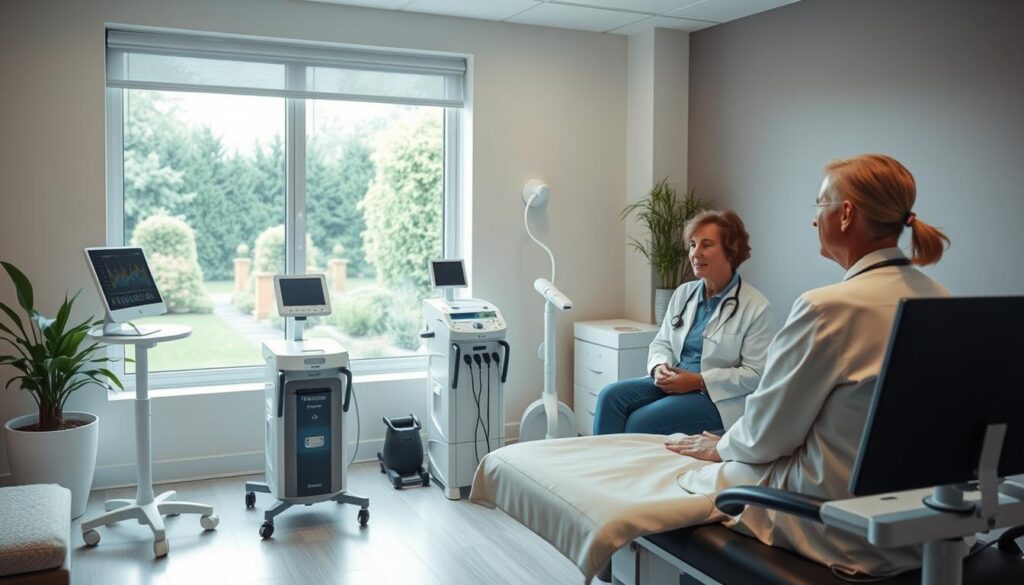
Therapeutic Options for Managing Anxiety Related to Sleep Disorders
Cognitive Behavioral Therapy for Insomnia (CBT-I) can help reduce nighttime stress. It also improves sleep quality. Mindfulness practices, like deep breathing, can calm the nervous system and help with both conditions.
Medications like SSRIs might be used carefully. This is to avoid any bad effects on breathing.
| Outcome Measure | OSA Group | Control Group | P-value |
|---|---|---|---|
| PSS (Stress) | 15.3 | 11.4 | 0.002 |
| GAD-7 (Anxiety) | 4.8 | 2.1 | 0.02 |
| PHQ-9 (Depression) | 6.9 | 2.6 | 0.003 |
Dealing with the sleep apnea anxiety connection needs a team effort. Work with sleep specialists and mental health providers. Focus on treatments that improve both physical and emotional health for lasting relief.
Real Stories: How Treating Sleep Apnea Reduced Anxiety for Patients
Many people feel better after treating sleep apnea. Let’s look at how real patients improved their mental health. Research shows a strong link between sleep apnea and anxiety.
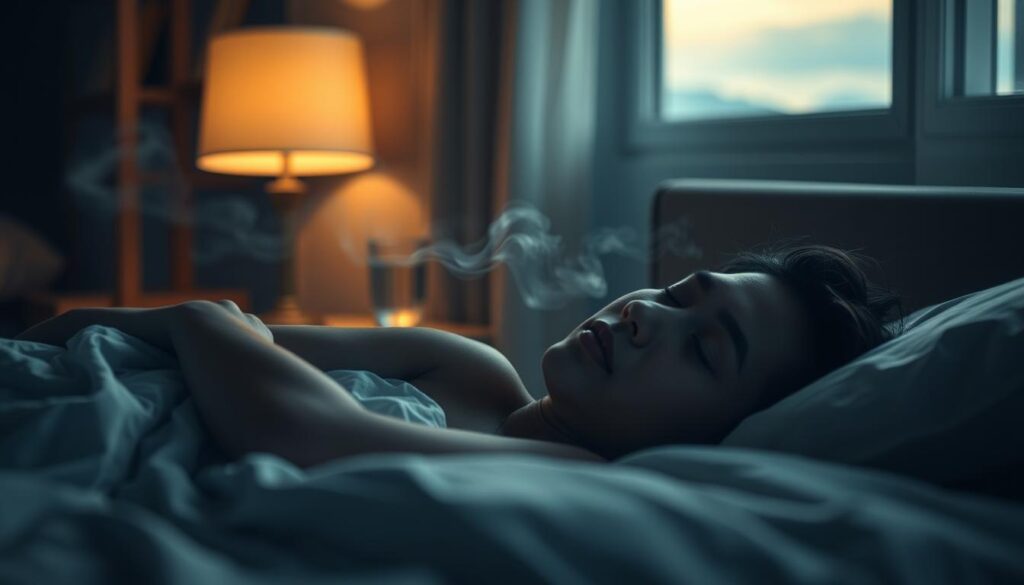
Sarah, a 45-year-old teacher, had panic attacks and worry for years. Her doctor said she had obstructive sleep apnea (OSA). She started using a CPAP machine and felt better.
“The machine stopped my nighttime gasping. My panic attacks dropped from daily to rare,” she said. A 2020 study by Takaesu et al found CPAP helped patients with OSA and anxiety.
Others found success with upper airway stimulation (UAS). Over 3,000 patients used this FDA-approved device. Cleveland Clinic named it a top 2018 medical innovation.
Mark, a user, said, “The implant helped me sleep deeply. My doctor noticed I needed fewer anti-anxiety meds.”
But, challenges exist. 40% of CPAP users struggle with masks. Emily, a nurse, hated the mask at first. She switched to an oral appliance and felt better.
Combining therapies often works best. For example:
- Weight loss improved sleep and mood for 68% of patients in a 2022 study
- Positional therapy reduced nighttime awakenings and daytime anxiety
These stories show treating sleep apnea is about healing the whole person. The relationship between sleep apnea and anxiety means treating one can unlock progress in both. If you’re feeling anxious and unrested, talk to a sleep specialist. Your mental health may improve faster than you think.
Conclusion: Taking Control of Your Sleep Apnea and Mental Wellbeing
Your health is a cycle of connected parts. Sleep apnea and anxiety make a bad cycle. Poor sleep makes stress worse, and stress makes breathing problems worse.
Breaking this cycle starts with knowing how treatments work. Things like CPAP therapy or lifestyle changes can help. Millions of people face this, but there are solutions.
Good sleep apnea and anxiety treatment starts with a doctor’s check. A sleep study can show if you have apnea. Therapy or medicine can help with anxiety.
CPAP machines help you breathe right at night, which reduces stress. Simple steps like not drinking alcohol before bed or losing weight can also help. Remember, not treating apnea can make mental health problems worse. But, taking care of it can make things better.
Take control by making sleep a priority. Try to sleep for 7+ hours each night. Talk to your doctor about any symptoms you have.
The right treatment can calm your mind and give you more energy. Small steps today can lead to better sleep and days tomorrow. Your body and mind need to heal. Start talking to a healthcare provider now.







